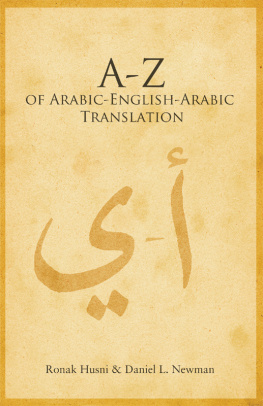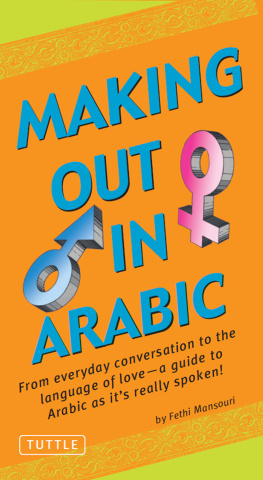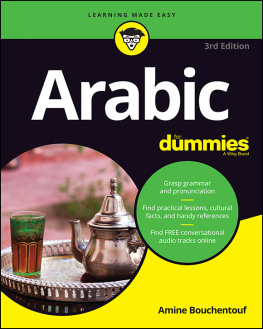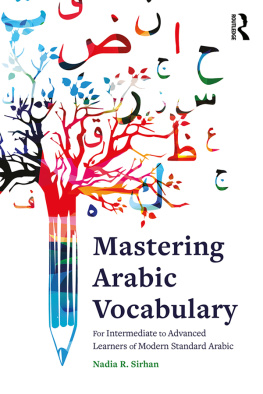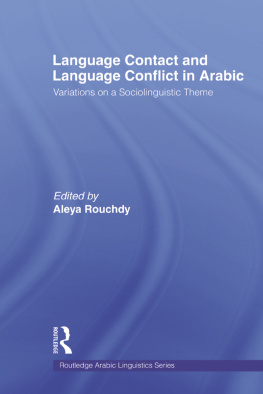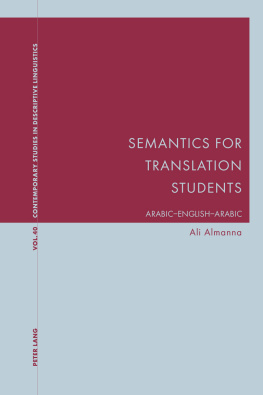Library of Arabic Linguistics
The reasons behind the establishment of this Series on Arabic linguistics are manifold.
First: Arabic linguistics is developing into an increasingly interesting and important subject within the broad field of modern linguistic studies. The subject is now fully recognised in the Universities of the Arabic speaking world and in international linguistic circles, as a subject of great theoretical and descriptive interest and importance.
Second: Arabic linguistics is reaching a mature stage in its development benefiting both from early Arabic linguistic scholarship and modern techniques of general linguistics and related disciplines.
Third: The scope of this discipline is wide and varied, covering diverse areas such as Arabic phonetics, phonology and grammar, Arabic psycholinguistics, Arabic dialectology, Arabic lexicography and lexicology, Arabic sociolinguistics, the teaching and learning of Arabic as a first, second, or foreign language, communications, semiotics, terminology, translation, machine translation, Arabic computational linguistics, history of Arabic linguistics, etc.
Viewed against this background, Arabic linguists may be defined as: the scientific investigation and study of the Arabic language in all its aspects. This embraces the descriptive, comparative and historical aspects of the language. It also concerns itself with the classical form as well as the Modern and contemporary standard forms and their dialects. Moreover, it attempts to study the language in the appropriate regional, social and cultural settings.
It is hoped that the Series will devote itself to all issues of Arabic linguistics in all its manifestations on both the theoretical and applied levels. The results of these studies will also be of use in the field of linguistics in general, as well as related subjects.
Although a number of works have appeared independently or within series, yet there is no platform designed specifically for this subject. This Series is being started to fill this gap in the linguistic field. It will be devoted to Monographs written in either English or Arabic, or both, for the benefit of wider circles of readership.
All these reasons justify the establishment of a new forum which is devoted to all areas of Arabic linguistic studies. It is also hoped that this Series will be of interest not only to students and researchers in Arabic linguistics but also to students and scholars of other disciplines who are looking for information of theoretical, practical or pragmatic interest.
The Series Editors
Modality, Mood and Aspect in Spoken Arabic
Library of Arabic Linguistics
Series Editors
Muhammad Hasan Bakalla
King Saud University, Riyadh, Kingdom of Saudi Arabia
Bruce Ingham
School of Oriental and African Studies, University of London
Clive Holes
Faculty of Oriental Studies, University of Cambridge
Advisory Editorial Board
Peter F. Abboud, University of Texas at Austin; M. H. Abdulaziz, University of Nairobi; Yousif El-Khalifa Abu Bakr, University of Khartoum; Salih J. Altoma, Indiana University; Arne Ambros, University of Vienna; El Said M. Badawi, American University in Cairo; Michael G. Carter, University of Sydney; Ahmad al-Dhubaib, King Saud University (formerly University of Riyadh); Martin Forstner, Gutenberg University at Mainz; Otto Jastrow, University of Erlangen-Nurnberg; Raja T. Nasr, University College of Beirut; C. H. M. Versteegh, Catholic University at Nijmegen; Bougslaw R. Zagorski, University of Warsaw.
Library of Arabic Linguistics
North East Arabian Dialects: Bruce Ingham
Transivity, Causation and Passivization: George Nemeh Saad
Language and Linguistic Origins in Bahrain: Mehdi Abdalla al-Tajir
A Linguistic Study of the Development of Scientific Vocabulary in Standard Arabic: Abdul Sahib Mehdi Ali
Language Variation and Change in a Modernising Arab State: Clive Holes
Saudi Arabian Dialects: Theodore Prochazka, Jr.
From Code Switching to Borrowing: Jeffrey Heath
Sibawayh the Phonologist: A.A. al-Nassir
T.F. Mitchell and S.A. al-Hassan
Monograph No. 11
Modality, Mood and Aspect in Spoken Arabic
With special reference to Egypt and the Levant
First published in 1994 by
Kegan Paul International
This edition first published in 2010 by
Routledge
2 Park Square, Milton Park, Abingdon, Oxon, OX14 4RN
Simultaneously published in the USA and Canada
by Routledge
711 Third Avenue, New York, NY 10017
Routledge is an imprint of the Taylor & Francis Group, an informa business
T.F. Mitchell and S.A. al-Hassan 1994
All rights reserved. No part of this book may be reprinted or reproduced or utilised in any form or by any electronic, mechanical, or other means, now known or hereafter invented, including photocopying and recording, or in any information storage or retrieval system, without permission in writing from the publishers.
British Library Cataloguing in Publication Data
A catalogue record for this book is available from the British Library
ISBN 10: 0-7103-0405-6 (hbk)
ISBN 13: 978-0-7103-0405-6 (hbk)
Publishers Note
The publisher has gone to great lengths to ensure the quality of this reprint but points out that some imperfections in the original copies may be apparent. The publisher has made every effort to contact original copyright holders and would welcome correspondence from those they have been unable to trace.
Editors Note
The present volume is the first full-length monograph derived from the Leeds University investigation into the structure of Educated Spoken Arabic which has so far been published, and it is sincerely hoped that it will not be the last. Although a number of journal articles on limited aspects of the corpus were published in the late 1970s and 1980s by various members of the Leeds research team, much of the analysis still remains in typescript. It would be difficult to underestimate the value of this corpus for the study of variation in modern Educated Spoken Arabic, since it is unique in its size, comprehensiveness, and geographical representativeness, covering educated spoken usage in all the major population centres of the eastern Arab world, and drawing from a wide variety of contexts of use. Area-wide studies of this type are very rare, and ones which rely on a large and representative data base are even rarer. The major contributions such studies can make to Arabic linguistics are two: synchronically, in showing just how much of the syntactic structure of modern Educated Spoken Arabic however much morphological and lexical variation may divide one region from another is in fact shared property; and, diachronically, if the degree of sharing of syntactic phenomena which cannot be plausibly derived from Classical Arabic turns out to be high (as from the present study it seems to be), in providing more evidence that ESA in fact represents a contemporary pan-Arab continuation of age-old shared spoken forms which were never identical with what we now call Classical Arabic, and which, through centuries of trade and constant contacts throughout the eastern Arab area, have continued to develop independently of it.






